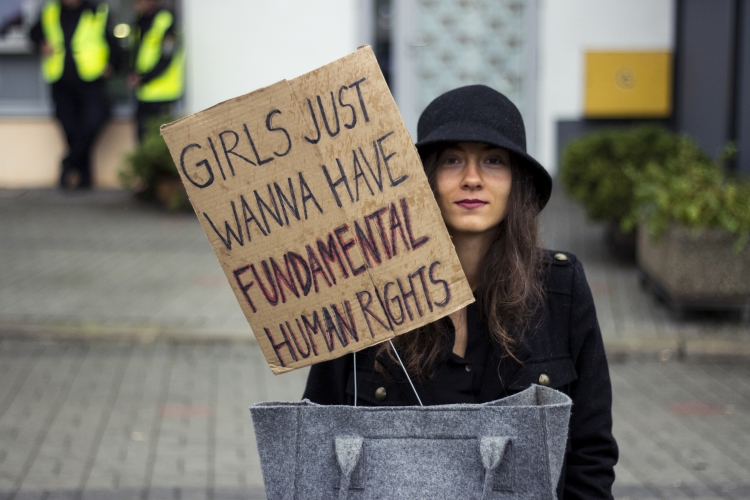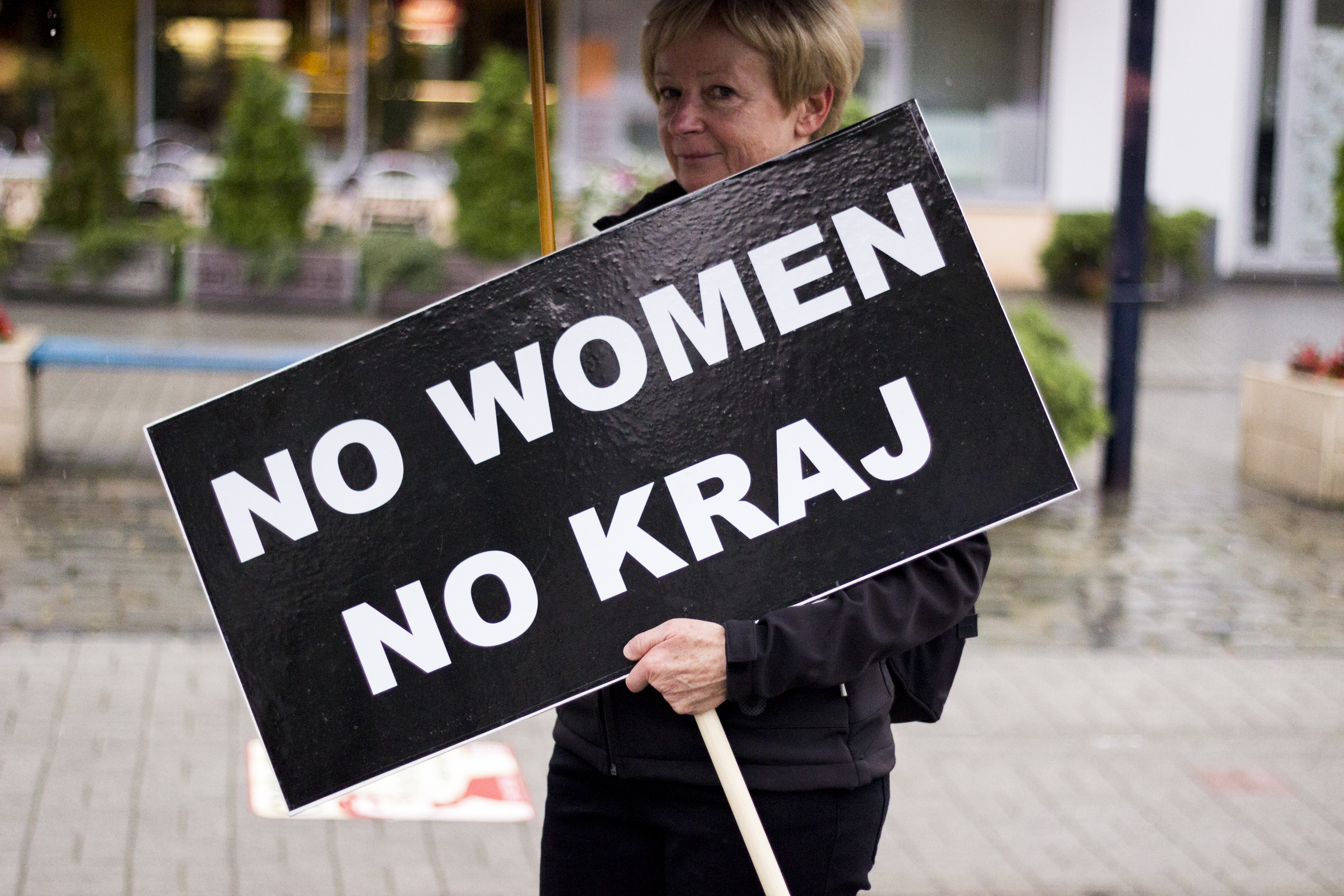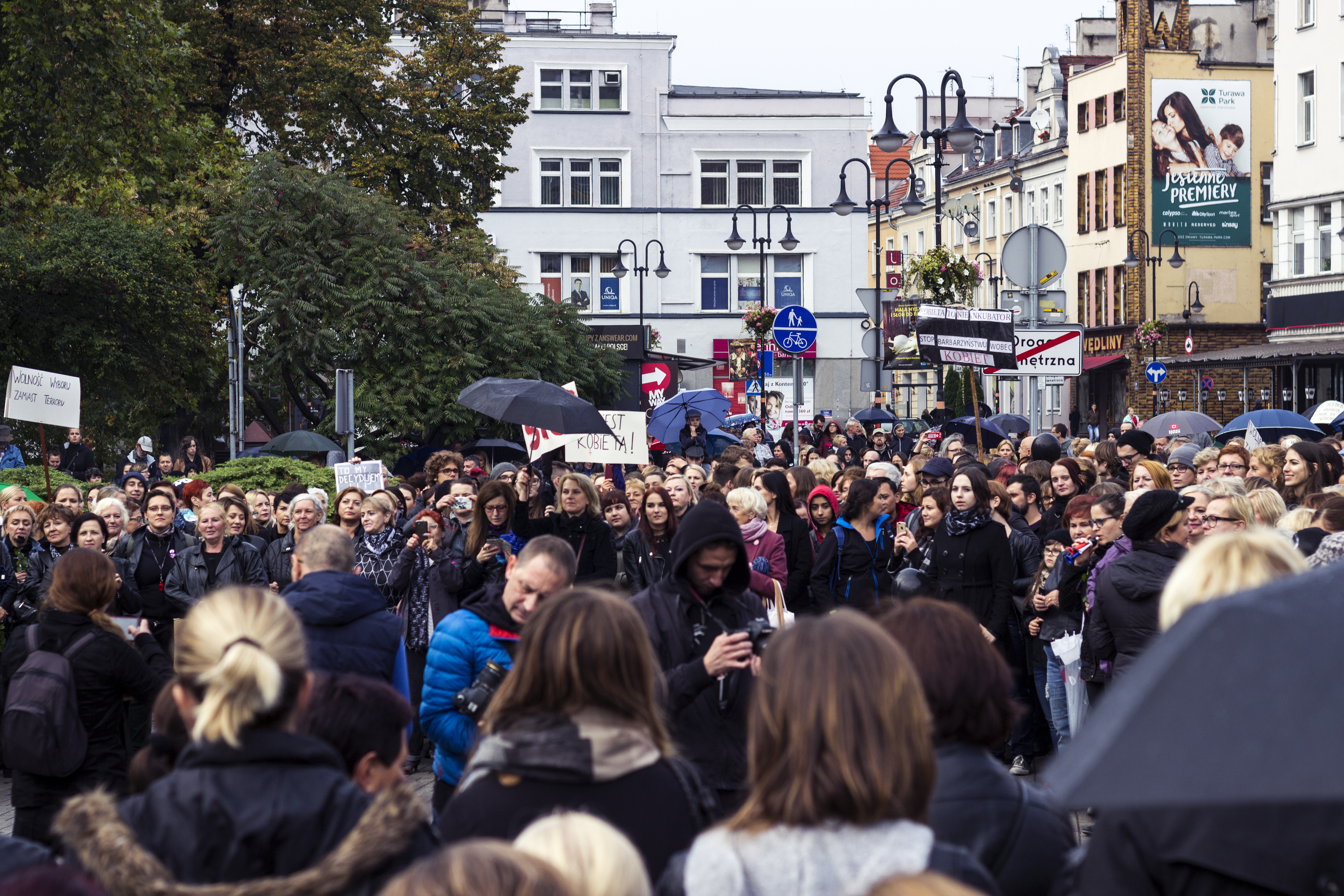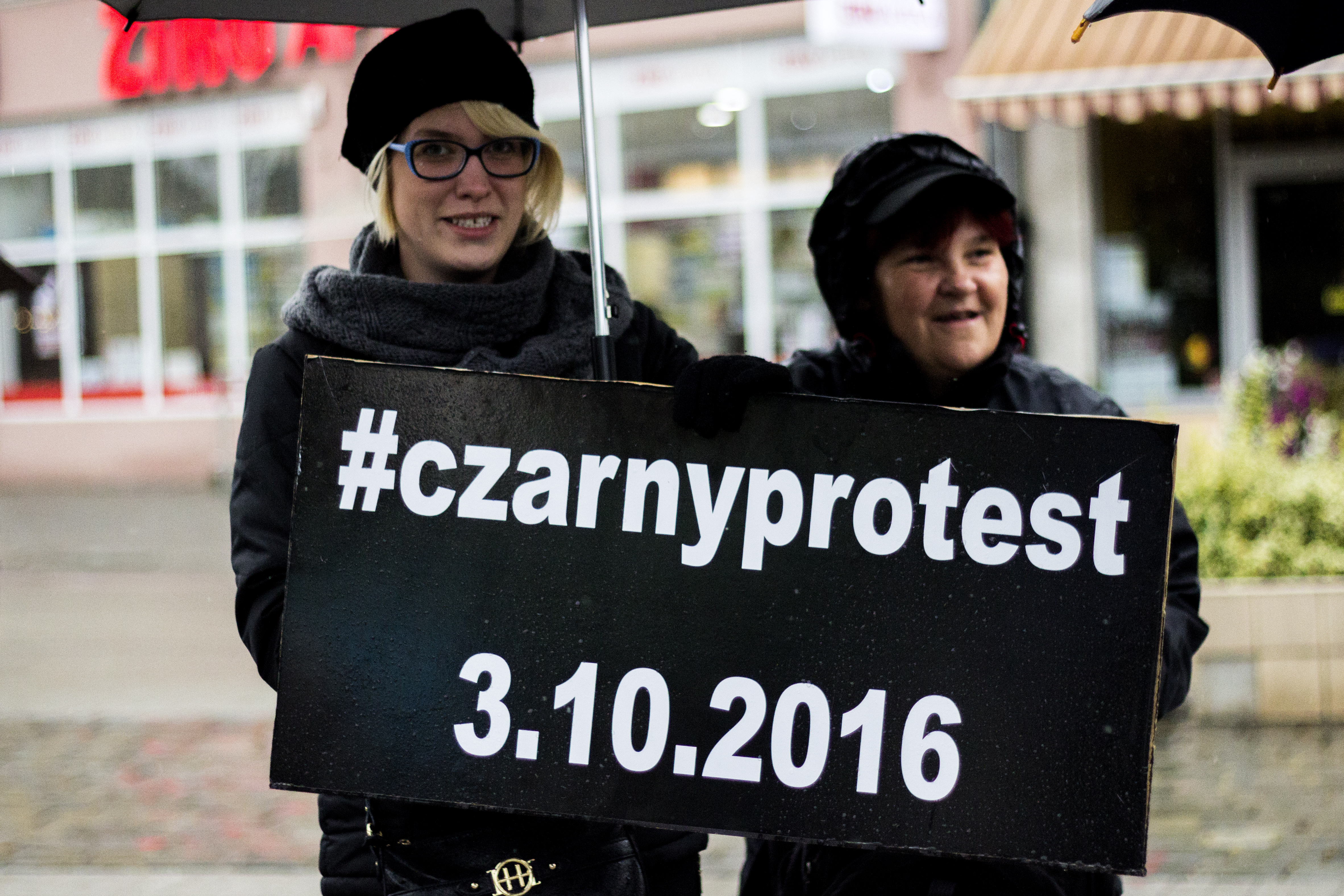Give Me My Body Back

On Monday October 3rd, "Black Monday" broke out in Poland. "Black Monday" is used to describe the mass protest against the Polish Government's push for an anti-abortion law. People, mostly women, took to the streets protesting the total ban on abortion and stricter control on contraception.
According to The Guardian "Tens of thousands of people boycotted work and classes on Monday to protest against the proposals." The estimated 100,000 people were able to push back against the ban, and the Poland's government decided to put the law on the back-burner because of the intense protest surrounding it. The amount of backlash and protest the government received actually scared some government officials.
Image Credit: Flickr/Iga Lubczańska
So Why The Protests?
In order to understand the protests that surround this issue, we must also know what the anti-abortion law would entail for women. The law that the polish government was attempting to push would put a blanket ban on abortion. This means that abortion would only be accepted in cases where the mother is in immediate danger. A women would no longer be able to receive an abortion in cases of rape, incest, or just an inability to properly care for a child. Not only is would the law be banning abortion, but also it would be criminalizing the act. Women who receive abortions or doctors who agree to perform them have the possibility of a five year prison term.
After knowing this, it made sense why protesting broke out. The law that they were protesting is extreme and also completely disregards a women's rights to her body. It de-legitimizes women's reproductive rights and forces them to carry a pregnancy no matter what situation brought them to having a child. The law undermines a women's right to their own body, disregards whether she has the support needed to be able to take care of a child, and it treats victims of sexual aggression as trivial with no care for their situation and mental health. If the law was placed in action, it could lead to women placing themselves in dangerous situations in order to avoid carrying a child that they are unable to care for.
Women within Poland spoke about the situation and also claimed that limiting the rights of women is dangerous and inhumane. According to an interview in The Guardian, 33 year-old Polish citizen Alo argues that she "has a hard time understanding why they would want to refuse [them] the right to have a choice...It's not about killing children but about basic dignity of a woman." She goes on to explain that if women get an abortion it is usually for a good reason, and is not taken as lightly as people may think.
Another woman went farther and stated that the law discriminated against poor women, who cannot afford to travel to countries that allow abortions or buy pills online. It is already hard within Poland to find a place willing to do abortions, and this law just makes it even worse, especially for women who can't afford to take different measures. This inability to obtain a safe means of abortion will lead to more dangerous ways of women aborting pregnancies such as: excessive smoking, excessive drinking, and self inflicted harm. The law would not be protecting women or preventing abortions, but doing the exact opposite. This paired with a lack of available contraceptives within Poland, only reassures that the rights of women are in danger.
Image Credit: Flickr/Iga Lubczańska
Not Just Poland
Poland is not the only country who has strict laws against abortion, plan B pills, or contraceptives. In 2015, Iran attempted outlaw voluntary sterilization methods such as vasectomies and outlaw the use of contraceptives. This was proposed as a way of boosting birth rates within the country, but threatened the reproductive rights of women within Iran. Two other European states, Malta and the Vatican City, also outlaw abortion and have heavy restrictions on the availability of contraceptives.
In Malta specifically, women are denied the right to emergency contraceptives. I was able to speak to a women about her own experience dealing with their policy, and how it affected her:
"...I had a pregnancy scare in mid-November, I had already taken plan B twice recently so I was really worried about the possibility of pregnancy. I went to the gynecologist and she asked me why I wasn't on birth control, and I told her it was because I took medication that rendered any hormonal birth control ineffective. I knew most doctors would not give the copper IUD to women who hadn't already had children. Luckily this gynecologist was amazing and wrote me a script to get the IUD at another appointment. I then moved to Malta for the summer which is super conservative Catholic and where not only condoms are extremely expensive, but the morning after is not available..."
If she had not gone to the gynecologist before her stay in Malta, she would not have been able to receive the same care and treatment. Also, even though she did receive the IUD, birth control aren't always 100% effective. Also, birth control methods do not protect you against sexually transmitted diseases. Only condoms are able to protect you against that, and the fact that Malta makes them so unobtainable due to their high price, only endangers women to being subject to STD's.
Currently, there is push to allow access to emergency contraceptives within Malta. So there is hope that women can take back their rights to their own bodies, but nothing is set. There is still a long way to go before this happens, especially in a country so religiously rooted in their decision of anti-abortion.
Image Credit: Flickr/Iga Lubczańska
What Does It Mean For Us?
Why should we be aware of the protest occurring in Poland or even Malta? Well just take a moment. Have you ever known a friend or even a friend of a friend who had to drop out of university due to a pregnancy? Have you or anyone else been the victim of sexual aggression that resulted in an unwanted pregnancy?
Well imagine if you didn't have a way to get out situations like this. Imagine that you had to put your whole life on hold to deal with a child that was unexpected an unplanned for. Imagine that you had to live with a reminder of a sexual attack. This is the reason why we need to be aware of these occurrences in women's rights. They effect all of us, and as young women in today's world we need to be aware of what decisions people are trying to pass about our body.
I was able to speak with Elizabeth McGehee, co-founder of The Sexual Aggression Awareness Team* here at the American University of Paris, to discuss what effects this could have on young women:
A: Do you think that Poland's anti-abortion proposition could lead to women leaning towards more dangerous options to terminate or prevent pregnancies?
E: Absolutely, I think it would result in a vast number of unsafe or self-induced abortions or substance abuse in order to terminate the pregnancy. While this is incredibly unfortunate, it is often inevitable when women or girls are faced with the decision of raising a child under circumstances that are not suitable for raising children. This could range from lacking access to financial means for supporting the child, instability within the home, or if a woman is simply unprepared to express the love and support that is necessary in order to raise a child. The decision takes on a whole new meaning when the woman becomes pregnant as a result of rape or incest.
A: As a young women, how would you feel about a government entity putting restrictions on what you can or can't do with your body?
E: I would feel as though I was being stripped of personal freedom and the agency to govern my own body based on my own choices. I would feel like it was my duty to rise and protest for my rights like the women in Poland. I would feel slighted and mistreated. But I would also be very fearful if these restrictions persisted in the future, as one day I might have a daughter of my own who could be stripped of her personal freedom towards her body.
A: What are Poland's lawmakers not considering in pushing for this anti-abortion law?
E: The Catholic churches and conservative party, which rules in Poland, are simply not considering the potential danger women would face if they were robbed of the choice to have an abortion or not. It could not only affect her physical health but also her mental health. A woman might face anxiety and clinical depression (to name a few) if for example, she is carrying out a pregnancy that was a result of rape and/or incest while also facing a five year jail sentence if she decides to undergoe an abortion.
A:Since the ban does not allow women who suffer from rape or incest to terminate their pregnancy, do you think that the law is belittling acts of sexual aggression?
E: No words can properly explain or address the traumatizing effects that a rape has upon a women or a man. The difference for a woman is that she is able to become pregnant. Therefore I can only quote Renee DeVesty, a rape survivor and advocate for ending abuse and violence against women and girls: "Rape takes away your sense of self. You disappear...A pregnancy resulting from rape is a reminder of violence, hatred, and brutality forced upon your body. And to tell a woman who has gone through the horror of being raped, that she again doesn't have the power to control or decide what happens to her body afterward, is an outrage of epic proportions."
A: Although the ban in Poland has been put to rest as of right now, should women, especially young women like us who are in college and may be sexually active, be aware of their rights and fight for them?
E: In my personal (*cough* feminist *cough*) opinion, women and girls should constantly be aware of an fight for their political, economic, and social rights. Sexual discrimination can be manifested in the most subtle ways, and this kind of discrimination needs t o be brought to the surface, openly criticized, and be made known that it is unjust and illegitimate. The women of Poland and elsewhere in Europe who have protested against this law proposal epitomize the agency and capacity that women have to take action in protecting their own bodies.
Image Credit: Flickr/Iga Lubczańska
Because of their rise to action, the women of Poland were able to push back this extreme proposal, but that doesn't mean the fight is over. As we see with the case of Malta and Iran, women must constantly be aware and fight for our rights no matter what age. It's time to be aware of your body, and of who has control over it.
***
The Sexual Aggression Awareness Team at AUP is here to serve as a lighthouse for the AUP community. We are educating advocates to pass on the knowledge about what constitutes sexual assault, what measures must be taken thereafter, what can be done to prevent it, and how to create a platform where survivors can feel safe to speak up and seek help. As the SAAT, it is our responsibility to do our best to move towards creating a community that no longer tolerates sexual aggression. Please contact Elizabeth McGehee (a90680@aup.edu) or Ellen Kitchens (a90721@aup.edu) if you have any questions about SAAT. The first meeting discussing the mission of SAAT and prospective events after Fall Break.











